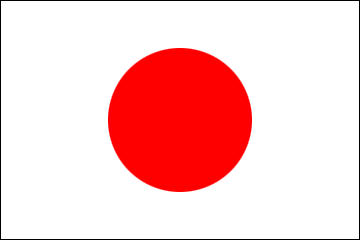Representatives of the Government of Japan and CARE attended the inauguration ceremony of agricultural water supply system built by the HAFORSA 2 project in Atsabe
2022/10/10
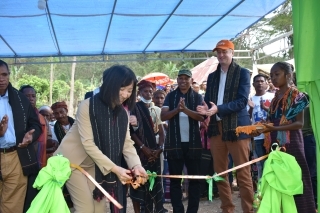 Tape Cut
Tape Cut
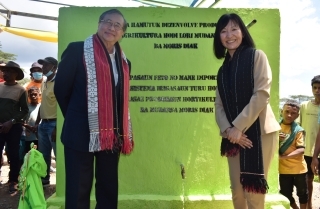 The water tank was inaugurated by Ms. Yamada, the Deputy Head of Mission, and Mr. Megata, the Chair of CARE International Japan
The water tank was inaugurated by Ms. Yamada, the Deputy Head of Mission, and Mr. Megata, the Chair of CARE International Japan
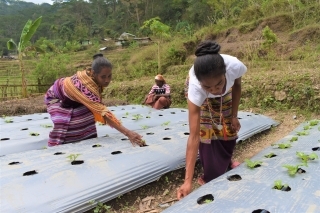 Local farmers are cultivating vegetables
Local farmers are cultivating vegetables
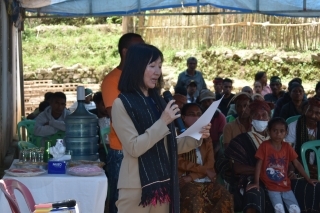 Deputy Yamada giving her speech
Deputy Yamada giving her speech
Ermera, 10 October, 2022 – Representatives of the Government of Japan, CARE in Timor-Leste, and CARE International Japan inaugurated a new agricultural water supply system in Atsabe, Ermera municipality, constructed under the “Atsabe Rural Development Project for Improvement of Agricultural Water Supply System in Ermera District (HAFORSA 2) Project”. In the ceremony, Mr. Lucio Romeiro Ribeiro, Director of Agriculture and Horticulture of the Ministry of Agriculture and Fisheries, and Ms. Kazumi Yamada, the Deputy Head of Mission of the Embassy of Japan opened the water supply system.
The HAFORSA 2 project, which aims to expand horticultural production with a focus on gender equality, is funded by the Government of Japan with the amount of approximately 1 million USD in 3 years. The project focuses on increasing the supply of water in drought-prone areas, and is implemented by CARE in close collaboration with the Ministry of Agriculture and Fisheries.
Ms. Kazumi Yamada, Deputy Head of Mission of the Embassy of Japan said, “This year marks the 20th anniversary of establishment of diplomatic relations between Japan and Timor-Leste. The people of Japan have always stood by the people of Timor-Leste in their effort for economic development and improvement in their lives. Today, Timor-Leste’s economy, with its heavy dependence on natural resources, needs diversification of industry, and agriculture is one of the most important sector for the future of this country. That is why Japan is committed to supporting this project which contributes to the improvement of agricultural productivity.”
Peter Goodfellow, Country Director of CARE in Timor-Leste said “The leadership of women amongst the farmers groups has been instrumental to the success of this project, and we hope that aspects of the women’s leadership and training program may be replicated in other such agricultural projects in Timor-Leste in future”.
Ms. Yasuko Kikuchi, Program Director of CARE International Japan, stated “The project period of HAFORSA 1 (2016~2019), saw a lot of improvements in the productivity of agricultural products but it also identified that water accessibility restricted further increase in agricultural production. With a special focus on the construction of drip-irrigation and plastic tunnels, HAFORSA 2 has successfully driven farmers to engage in year-round production of horticulture crops, which leads to further increase in horticulture crops, and eventually leads to improvement of their livelihood”.
CARE works with 12 local farmer groups in four villages in Atsabe. Some of the farmer groups sell vegetables to local schools for the school feeding programme, and others sell vegetables at local markets. Five groups established agricultural water supply systems last year and expanded their farmlands. This year, the five groups installed the drip-irrigation systems by themselves and seven more groups also built agricultural water supply systems. The drip-irrigation systems allow farmers to grow more vegetables with less labor-intensive activities.
The project also addresses issues of unequitable power relations between female and male farmers by challenging traditional views on women’s roles in agriculture, promoting equitable workloads and decision-making power between women and men, and advancing women’s economic empowerment.
The HAFORSA 2 project, which aims to expand horticultural production with a focus on gender equality, is funded by the Government of Japan with the amount of approximately 1 million USD in 3 years. The project focuses on increasing the supply of water in drought-prone areas, and is implemented by CARE in close collaboration with the Ministry of Agriculture and Fisheries.
Ms. Kazumi Yamada, Deputy Head of Mission of the Embassy of Japan said, “This year marks the 20th anniversary of establishment of diplomatic relations between Japan and Timor-Leste. The people of Japan have always stood by the people of Timor-Leste in their effort for economic development and improvement in their lives. Today, Timor-Leste’s economy, with its heavy dependence on natural resources, needs diversification of industry, and agriculture is one of the most important sector for the future of this country. That is why Japan is committed to supporting this project which contributes to the improvement of agricultural productivity.”
Peter Goodfellow, Country Director of CARE in Timor-Leste said “The leadership of women amongst the farmers groups has been instrumental to the success of this project, and we hope that aspects of the women’s leadership and training program may be replicated in other such agricultural projects in Timor-Leste in future”.
Ms. Yasuko Kikuchi, Program Director of CARE International Japan, stated “The project period of HAFORSA 1 (2016~2019), saw a lot of improvements in the productivity of agricultural products but it also identified that water accessibility restricted further increase in agricultural production. With a special focus on the construction of drip-irrigation and plastic tunnels, HAFORSA 2 has successfully driven farmers to engage in year-round production of horticulture crops, which leads to further increase in horticulture crops, and eventually leads to improvement of their livelihood”.
CARE works with 12 local farmer groups in four villages in Atsabe. Some of the farmer groups sell vegetables to local schools for the school feeding programme, and others sell vegetables at local markets. Five groups established agricultural water supply systems last year and expanded their farmlands. This year, the five groups installed the drip-irrigation systems by themselves and seven more groups also built agricultural water supply systems. The drip-irrigation systems allow farmers to grow more vegetables with less labor-intensive activities.
The project also addresses issues of unequitable power relations between female and male farmers by challenging traditional views on women’s roles in agriculture, promoting equitable workloads and decision-making power between women and men, and advancing women’s economic empowerment.
